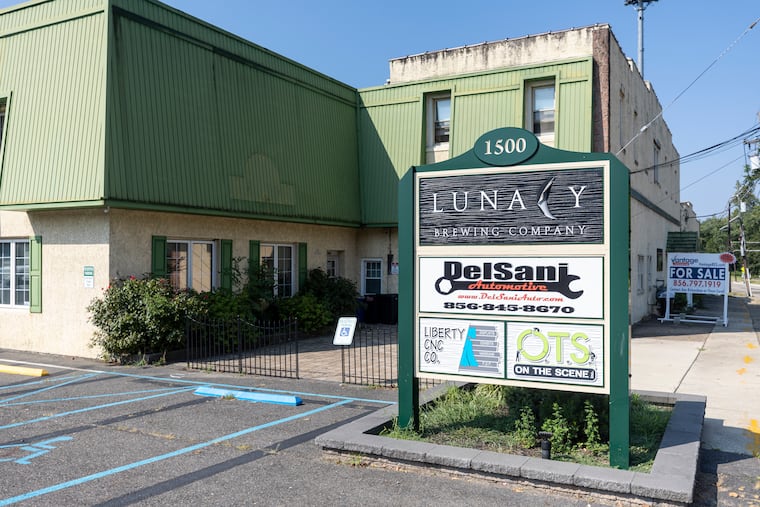Owners of Lunacy Brewing in Haddon Heights going out of business, blaming state regulations
State guidelines restrict food availability, limit brewery events, and stipulate the number and size of brewery televisions meant to entertain customers.

Lunacy Brewing Company in Haddon Heights will close its doors on Saturday, claiming to be a victim of strict state regulations that hamper the craft brewery business, according to a co-owner.
“We’ve had better days, my friend,” said Rick Lees, who cofounded the Camden County brewery nine years ago. “There’s a knife in our backs and it sucks.”
While several financial problems have hampered Lunacy, Lees said, the most profound have stemmed from New Jersey Division of Alcoholic Beverage Control rules for breweries — based on state legislation — that went into effect in 2019.
The guidelines stipulate that before drinking beer, customers must tour the brewery. No kitchens are allowed, and beverages such as coffee and soda can’t be served. No more than two televisions per brewery are allowed, each not permitted by the state of New Jersey to exceed 65 inches.
While customers are permitted to carry in meals from restaurants, breweries can’t make their own arrangements with those restaurants (or with food trucks) to regularly prepare and deliver food.
The toughest rule, according to Lees, 50, of South Philadelphia, has been the prohibition of more than 25 “special events” annually, such as trivia contests, fund-raisers, and open-mic nights. There are also stipulations about advertising these events, as well as showing championship sports games like the World Series on TV.
The rules derive from 2012 state legislation that labeled the state’s roughly 140 brewers as manufacturers with beer-tasting rooms — not bars. The idea was to nurture breweries without siphoning business from bars and restaurants that pay $500,000 or more for liquor licenses. Brewer manufacturer licenses run from around $1,250 to $7,500.
After loud protests from breweries, the state Legislature passed a bill in June that would end many of the restrictions, allowing places more autonomy.
The most significant change would eschew the 25-event rule, and allow breweries to hold an unlimited number of events. Breweries would also be able to show whatever televised events they wanted. Further, they’d have much more flexibility to work with food vendors, caterers, and food trucks to coordinate food service.
It was sent to Gov. Phil Murphy’s desk for signature, and while people awaited the governor’s decision, the ABC agreed not to enforce brewery rules until the end of the year.
While the temporary lifting of rules is helpful, Lees said they come too late for Lunacy.
Last week, Jennifer Sciortino, a senior adviser to the governor, said that Murphy plans to conditionally veto the bill, and will ask the legislature for “a broader liquor license reform initiative as we continue to work toward a comprehensive legislative solution.”
In the case of a conditional veto, the governor would send back the bill with language containing his suggested amendments. If the Legislature were to agree to them and pass those amendments, the bill would then go back to the governor to sign. If it doesn’t, the veto would stand.
“The Governor unequivocally supports easing restrictions on New Jersey breweries,” Sciortino wrote in the email. ”However, he has been clear that our outdated liquor license system needs comprehensive reform, not a piecemeal approach, in order to ensure equity and affordability so that all small businesses and the entire industry as a whole will benefit.”
Currently, the state’s laws for bars and restaurants restrict the number of liquor licenses to one for every 3,000 residents in a municipality. Murphy has said he wants to phase out the population-cap rules.
Wary of proposed changes, the estimated 6,500 New Jersey liquor license holders believe a lifting of the caps will allow more licenses to be issued, causing the value of theirs to plummet.
The overall uncertainty is a problem that Lees said he can’t overcome, even with the temporary easing of restrictions.
“We’re trying to plan our future but we don’t know the rules,” he said.
Lees said that he and his partners will be unable to secure needed improvement loans. “We can’t go to a bank and say we need money, but we don’t know what the state will be doing,” he added. “The bank doesn’t want to hear that.”
Eric Orlando, executive director of the Brewers Guild of New Jersey, the trade association for craft breweries, said that many people in his business have been thrust into a tense sort of limbo.
“During this period with rules lifted, many breweries can do a lot of what they want, except put in kitchens,” Orlando said. “But for some breweries, the stay isn’t enough to make up for lost time and improve their financial conditions.
“Plus, folks want to plan for 2024 and don’t know what will happen. We’re hostages.”
Orlando said a few breweries have been forced to close under “onerous” rules, and some others are looking to sell.
After shuttering Lunacy’s doors, Lees said, he’s not sure what he’ll do next.
“All I know is, I’m gonna rest my head, get my thoughts together, and find another business that will not be in this state,” he said. “New Jersey has 100% driven me out of business.”